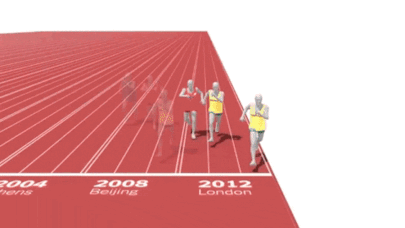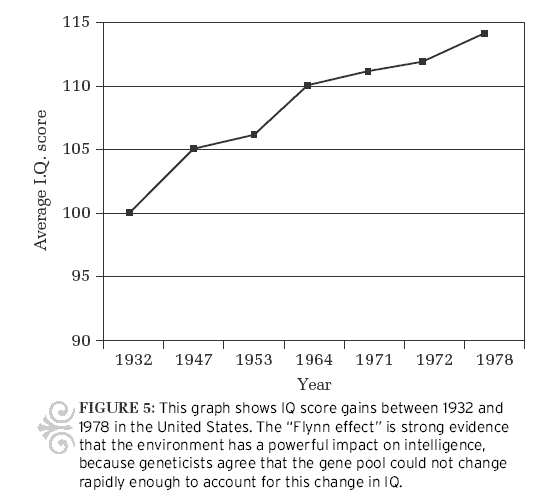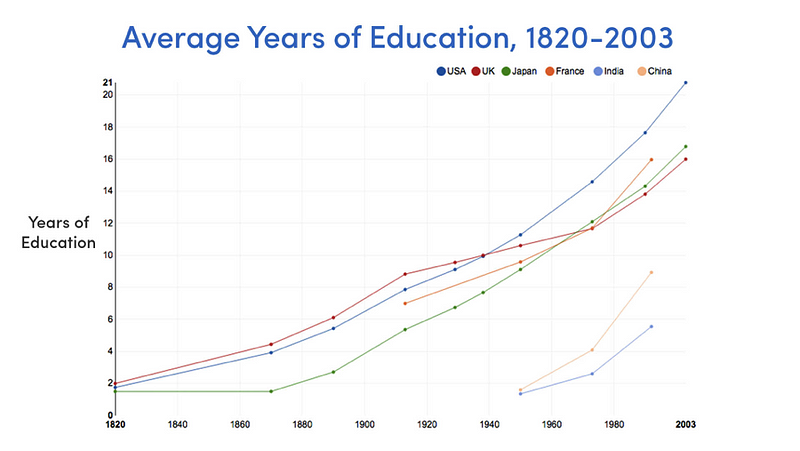Why Being Great Is So Much Harder Than People Realize

“What’s going on here? What does this say about how greatness is achieved?”
In this article, I make the case that what we’re seeing here is a pattern that happens across almost all fields and industries: The amount to learn in order to be great is increasing exponentially.
- To get a quick start, competitors first copy the best practices of the top performers.
- Once they hit the best practice frontier, they then focus on experimentation. These experiments are often informed by best practices from other fields and new tools. In other words, they follow Pablo Picasso’s advice of “Learn the rules like a pro, so you can break them like an artist.”
- Most experiments fail, but the ones that succeed become best practices and are copied by others.
- The body of knowledge that one must master in order to be great increases.
- Knowledge is always becoming outdated. However, occasionally, completely new paradigms arise where large bundles of old best practices become obsolete and early adopters create a bundle of new practices that create a new paradigm.
The history of running backs this up. Throughout the period when world records were improving, so too were the training paradigms: from intensity training to interval training to a focus on endurance. Each generation built upon the previous generation’s lessons and built new paradigms for training, technique, equipment and health. Or as Isaac Newton eloquently said:
“If I have seen further than others, it is by standing upon the shoulders of giants.”
Running is a microcosm of what’s happening in the work world as knowledge explodes (social media content is doubling every year, digital information is increasing tenfold every five years, academic research is doubling every nine years). This explosion creates exponentially more “best practices” for us to build upon if we want to be great.
We must also learn more because our existing knowledge is becoming obsolete at a faster and faster rate. One academic study, for example, found that the decay rate in the accuracy of clinical knowledge about cirrhosis and hepatitis was 45 years. In other words, if you’re talking to a 70-year-old liver specialist who hasn’t updated his skills, you have a 50 percent chance of getting bad information. Engineering degrees went from a half life of 35 years in 1930 to about 10 years in 1960.
The explosion of knowledge and the corresponding decay make one thing clear: we need to put a bigger priority on constant learning — as big an emphasis as we put on getting our optimal daily dose of nutrients, exercise, and sleep.
The Law Of Accelerated Intelligence
According to Our World In Data, the average person in developed societies has been spending more and more time learning in formal settings over the last two centuries.
Source: Our World In Data: Global Rise Of EducationThe same holds true with informal learning outside of traditional institutions, which accounts for 70 to 90 percent of all learning. Podcasts, videos, articles, games, and digital courses give people the ability to learn almost anything online for free.
A similar trend is happening with intelligence. One of the most surprising trends in psychology is called the Flynn Effect. It shows how intelligence test scores, which historically have been thought of as “fixed,” have continued to rise in many parts of the world over the past century.

Why is this all happening? I’d argue that the reason is what I call the Law of Accelerated Intelligence:
As our amount of accumulated knowledge increases exponentially, the minimum amount of learning we need to do in order to productively participate or be a top performer in society increases. In other words, accelerated societal change necessitates accelerated intelligence.
Or as economist Ben Jones puts it, “If one is to stand on the shoulders of giants, one must first climb up their backs, and the greater the body of knowledge, the harder this climb becomes.”
We’ve already felt this in our own daily lives too. When I first learned web design, all I needed to know was HTML and how to use Adobe Photoshop. Now, a web designer is expected to understand other languages too, understand how to do testing and analytics, and how to use a huge suite of other tools. And whether your career is web design, sales, journalism, or real estate, the digital world generated dozens of new skills to master.
For example, data science, programming, and artificial intelligence used to be niche skills. Now, having a basic understanding of them is more and more important for more and more professions. It’s no longer enough to just get a degree or take a professional development course once a year. The learning needs to be constant.
Just like with running, being among the best gets more and more demanding with each passing year. Each generation of champions develops a body of best practices. The next generation must learn them and then build upon them, leaving those who come after them with even more to learn to get up to speed. And the cycle continues.
Granted, the process of creative destruction where new industries and fields form provides windows of opportunity where people with new, important knowledge can leapfrog others with more overall experience. Many great tech entrepreneurs have been able to succeed at a young age by devoting years of deliberate learning to a new field before anybody else. But, their success doesn’t mean that they can slow down their own learning. In fact, it often means that they need to speed it up.
Predicting The Future Of Learning
In 1965, Gordon Moore, one of the co-founders of Intel, noticed an interesting pattern: the number of transistors in a dense integrated circuit doubled every two years historically.
This underlying pattern has had a profound effect on society. For example, your current smartphone has more computing power than the mainframes NASA used to run Apollo missions back in the ’60s. Furthermore, knowledge of Moore’s Law has made it possible to make remarkably accurate predictions of the future. It has also become a self-fulfilling prophecy: Intel, for example, plans their innovation cycles of chips partially around Moore’s Law.
The Law Of Accelerated Intelligence has lasted for many decades, and perhaps for hundreds of years. We as individuals and as societies should plan our future around it, just as the technology industry plans its future around Moore’s Law.
The Law Of Accelerated Intelligence Formula
People who want to be top performers now and in the future need to optimize this Accelerated Learning Formula:

Time Spent Learning: As I make the case for in 5-Hour Rule: If you’re not spending 5 hours per week learning, you’re being irresponsible and Bill Gates, Warren Buffett And Oprah All Use The 5-Hour Rule, the minimum amount of learning that professionals should do on a weekly basis is 5 hours.
Learning Rate: We do have the ability to increase our learning rate. This ability is not dependent on our intelligence. It’s dependent on mastering the skill of learning how to learn. Mastering this skill early allows the benefit of the skill to compound throughout one’s life.
Intelligence Augmentation: We live in a time when our own intelligence can be dramatically amplified by affordable, powerful tools. For example, one class of tools help us to build larger, more connected, more diverse networks that augment our own intelligence and allow us to accomplish more on teams than we could on our own. Another class of tools allow us to find and build datasets of the actions and results of top performers in our industry so we can algorithmically understand the subtle patterns of greatness. Taking the time to learn about these tools and methods will become more and more critical.
Identify valuable knowledge at the right time. The value of knowledge isn’t static. It changes as a function of how valuable other people consider it and how rare it is. As new technologies mature and reshape industries, there is often a deficit of people with the needed skills, which creates the potential for high compensation. Because of the high compensation, more people are quickly trained, and the average compensation decreases.
Interested in applying the Law of Accelerated Learning Formula to your life? Over the last three years, I’ve researched how some of the world’s best learners and most successful entrepreneurs find the time to learn, stay consistent in their learning ritual, and get more results from their time. There was too much information for one article, so I spent dozens of hours and created a free masterclass to help you master your learning ritual too!
Sign up for the free Learning How To Learn webinar here >>
Join The Discussion
I’m interested in improving the thinking behind this thesis. The best way to improve thinking is by challenging it. To that end, there is a great discussion going on in our Learning How To Learn Facebook Group (40,000+ members). Join the thread by clicking here.

| - | I teach people to learn HOW to learn |
| - | Bootstrapped million dollar social enterprises |
| - | Best-selling author |
| - | Contributor: Time, Fortune, and Harvard Business Review |
| - | Alum: Ernst & Young Entrepreneur Of The Year, Inc. 30 under 30, Businessweek 25 under 25 |
| - | Creator of the largest learning community in the world |
| - | Have read thousands of books |
Read more about me…


